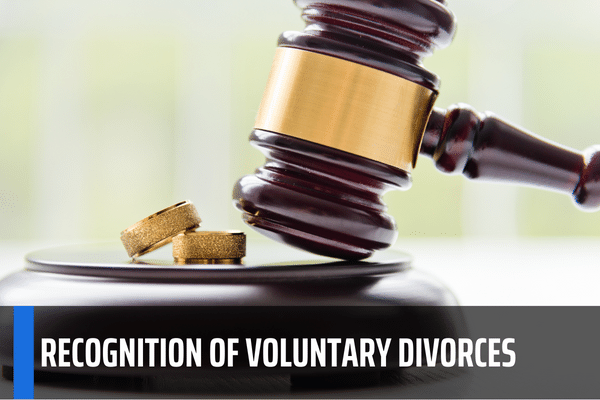What documents should be prepared for recognition of voluntary divorces in Vietnam? Who has the authority to process divorce petitions?
What documents should be prepared for recognition of voluntary divorces in Vietnam?
Pursuant to Article 396 of the Code of Civil Procedure 2015, any person requesting recognition of voluntary divorces must submit petitions. A petition must include information includes:
- Petitions for recognition of voluntary divorces;
- Agreements on child custody and property division upon divorces are well-grounded and lawful.
He/she also needs to prepare:
- Marriage registration certificate (original);
- Household registration book (certified copy);
- ID card/Citizen ID card/passport (certified copy);
- Other documents and evidences evidencing common property such as: Certificate of land use right, certificate of house ownership; vehicle registration; passbook… (copy);
- Documents, evidences and papers proving the debts and property obligations of the husband and wife during the marriage period (copy);
- If both parties register their marriage under foreign law and want to get a divorce in Vietnam, they must consularly legalize the marriage registration certificate and carry out the procedures for noting it in the register at the Department of Justice before submitting the application for divorce;
- Other papers and documents (if required).

What documents should be prepared for recognition of voluntary divorces in Vietnam? Who has the authority to process divorce petitions? (Image from the internet)
Who has the authority to process divorce petitions in Vietnam?
Pursuant to the provisions of Article 35 of the Code of Civil Procedure 2015 as follows:
Jurisdiction of People’s Courts of districts
1. People's Courts of districts shall have the jurisdiction to settle according to first-instance procedures the following disputes:
a) Disputes over civil matters, marriage and family, prescribed in Articles 26 and 28 of this Code;
b) Disputes over business/trade activities prescribed in clause 1 Article 30 of this Code;
c) Labor disputes prescribed in Article 32 of this Code.
2. People's Courts shall have the jurisdiction to resolve the following petitions:
a) Civil petitions prescribed in Clauses 1, 2, 3, 4, 6, 7, 8, 9 and 10 of Article 27 of this Code;
b) Petitions relating to marriage and family prescribed in Clauses 1, 2, 3, 4, 5, 6, 7, 8, 10 and 11 of Article 29 of this Code;
c) Petitions relating to business/trade activities prescribed in clause 1 and clause 6 Article 30 of this Code;
d) Labor petitions prescribed in clause 1 and clause 5 Article 33 of this Code.
3. Disputes and petitions prescribed in Clauses 1 and 2 of this Article, which involve parties or properties in foreign countries or which must be judicially entrusted to representative agencies of the Socialist Republic of Vietnam overseas or to foreign courts/competent agencies, shall not fall under the jurisdiction of people's Courts of districts, except for cases specified in clause 4 of this Article.
4. People’s Courts of districts where Vietnamese citizens reside shall be in charge of cancelling illegal marriage, settling divorce petitions and disputes pertaining to rights and obligations of spouses, parents and children, parents and children adoption and guardian relationship between Vietnamese citizens living in frontier areas and citizens of neighboring countries living near Vietnam according to provisions of this Code and other Vietnam’s law provisions.
Thus, when they agree to divorce, two people can agree to go to the district-level People's Court to carry out the procedures.
When will the court of Vietnam recognize the divorce by mutual consent?
According to the provisions of Article 55 of the Law on Marriage and Family 2014 as follows:
Divorce by mutual consent
When both spouses request a divorce, a court shall recognize the divorce by mutual consent if seeing that the two are really willing to divorce and have agreed upon the property division, looking after, raising, care for and education of their children on the basis of ensuring the legitimate interests of the wife and children. If the spouses fail to reach agreement or have reached an agreement which -fails to ensure the legitimate interests of the wife and children, the court shall settle the divorce.
Thus, when both spouses request a divorce, a court shall recognize the divorce by mutual consent if seeing that the two are really willing to divorce and have agreed upon the property division, looking after, raising, care for and education of their children on the basis of ensuring the legitimate interests of the wife and children.
LawNet
